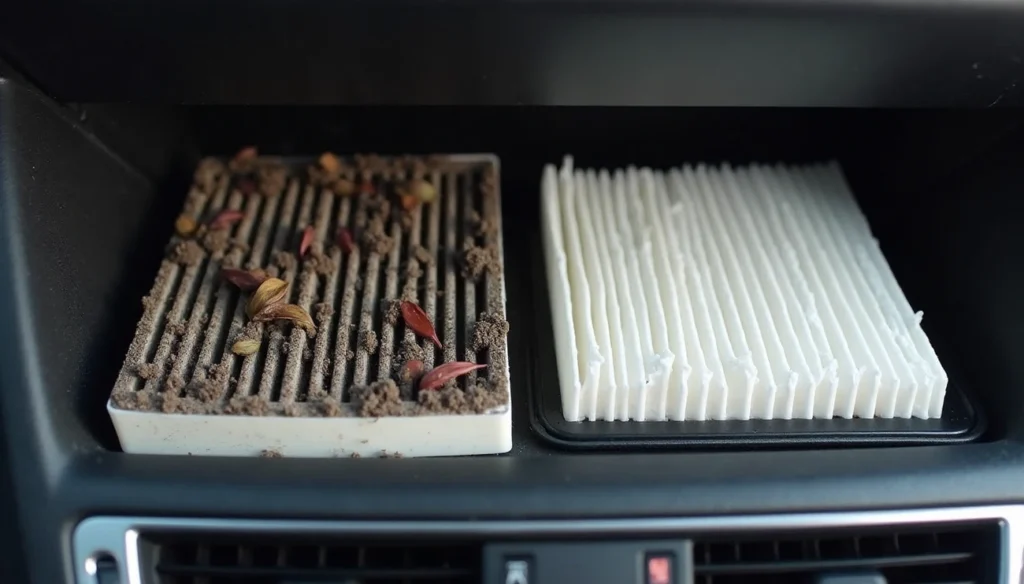
Did you know how often to change cabin air filter depends on your driving conditions and vehicle manufacturer? Most experts recommend replacing it every 12,000-15,000 miles or once a year, though some suggest intervals of 20,000-30,000 miles.
However, these are just general guidelines. Specifically, if you have allergies or frequently carry passengers, you might need to change your cabin air filter twice as often. Additionally, your location matters – driving in dusty or heavily polluted areas requires more frequent replacements. In fact, seasonal changes can also impact your cabin air filter lifespan, with experts suggesting replacements in Fall for better winter defrosting and in Spring for optimal summer air conditioning.
What happens if you ignore these cabin air filter change intervals? Poor air quality inside your vehicle is just the beginning. Throughout this article, we’ll explore the warning signs that indicate your filter needs replacing and explain why maintaining this often-overlooked component is crucial for both your comfort and your vehicle’s performance.
How Often Should You Change Your Cabin Air Filter?
The standard recommendation for cabin air filter replacement generally falls between 15,000 and 30,000 miles under normal driving conditions. Nevertheless, many automotive experts suggest a more frequent interval of 12,000 to 15,000 miles or approximately once per year. Your vehicle’s owner’s manual remains the most reliable source for specific recommendations tailored to your make and model.
Consequently, your driving environment plays a crucial role in determining the optimal replacement schedule. For instance, if you frequently travel through:
- Areas with high dust levels or construction zones
- Regions with poor air quality or heavy pollution
- Dusty terrains like deserts or dirt roads
- Locations with high pollen counts or seasonal allergens
Under these “severe” driving conditions, your cabin air filter may need replacement more often than the manufacturer’s standard interval. Furthermore, seasonal changes can dictate when to replace your filter. Many experts recommend changing it before spring to prepare for pollen season and again before winter to ensure optimal heating system performance during colder months.
Notably, laboratory tests have shown that a cabin air filter’s efficiency increases from 87% to 99% over time under controlled conditions. Yet, under real-world driving conditions, the same filter’s efficiency actually decreased from 87% to 58% despite similar dust loading. This highlights why following recommended replacement intervals matters.
The investment for a new cabin air filter typically ranges between $30 and $70, varying based on your vehicle’s specifications. While dealership installation might cost over $50, replacing it yourself can be relatively inexpensive and straightforward.
Remember that a properly functioning cabin air filter not only improves air quality inside your vehicle but optimizes your climate control system’s performance. Checking your filter’s condition every 10,000 miles or during routine maintenance appointments ensures you’ll catch any issues before they affect your driving comfort.
Warning Signs Your Cabin Air Filter Needs Replacing
Recognizing the warning signs of a failing cabin air filter can help you determine whether it needs replacement sooner than your scheduled maintenance interval. Initially, you might notice reduced airflow from your vehicle’s vents – a clear indication that air isn’t flowing freely through your filter system. This decreased airflow puts extra strain on your car’s HVAC system, making it work harder to circulate air.
Moreover, a telltale sign of a dirty filter is unpleasant odors circulating through your vents. If you detect musty, moldy, or sour smells, especially when using heat, your filter likely needs attention. These odors develop as your filter becomes saturated with moisture and debris.
Coupled with these issues, you might observe more dust settling on your dashboard and seats. This happens when the cabin filter reaches its maximum capacity and can no longer trap particles effectively. As a result, your interior may require more frequent cleaning.
Unusual noises often accompany a clogged filter. Listen for loud droning, rumbling, or whistling sounds when the fan is running. These noises typically become more noticeable at higher fan speeds and may indicate debris caught in the blower motor.
Another significant indicator involves foggy windows that take longer than usual to clear. Since a restricted cabin filter reduces airflow, your vehicle’s ability to defog windows diminishes considerably.
Primarily, you’ll notice poor HVAC performance overall. Your heating and cooling systems may struggle to maintain comfortable temperatures. This inefficiency forces your system to consume more energy, potentially increasing fuel consumption over time.
If you observe any of these warning signs, it’s wise to check your cabin air filter regardless of when it was last replaced. Remember that driving conditions significantly impact how often to change cabin air filter, sometimes necessitating replacement well before the recommended interval.
What Happens If You Don’t Change It?
Neglecting to replace your cabin air filter eventually leads to more serious issues beyond the warning signs discussed earlier. Primarily, your vehicle’s heating, ventilation, and air conditioning (HVAC) system suffers from increased strain as it struggles to push air through a clogged filter. This extra workload can shorten your blower motor’s lifespan and potentially lead to premature system failure.
From a health perspective, a severely clogged cabin air filter fails at its fundamental job—protecting you from harmful contaminants. Indeed, instead of filtering pollutants, an overloaded filter becomes a breeding ground for bacteria, mold, and mildew. These microorganisms thrive in the dark, moist environment of your filter and get circulated throughout your vehicle each time you use your climate control system.
Your vehicle’s performance also takes a hit. The additional strain on your HVAC system draws more power from your engine, which may result in decreased fuel efficiency. Meanwhile, accumulated debris can fall into your HVAC case, potentially damaging other components and leading to costly repairs down the road.
Beyond that, passengers with respiratory conditions or allergies will experience worsened symptoms when riding in your vehicle. Children and elderly individuals, whose immune systems might be more vulnerable, face even greater risks from the poor air quality.
Understanding how often to change cabin air filter becomes more crucial when you consider these cumulative effects. Rather than viewing it as optional maintenance, think of cabin filter replacement as essential preventive care for both your vehicle and your health. The modest cost of timely replacement certainly outweighs the expense of major HVAC repairs and potential health issues that can develop from prolonged exposure to contaminated air.
Conclusion
Maintaining your cabin air filter proves essential for both your vehicle’s performance and your personal health. Throughout this article, we’ve seen that while manufacturers generally recommend replacements every 12,000-30,000 miles, your specific driving conditions might necessitate more frequent changes.
Undoubtedly, your environment plays a crucial role in determining replacement frequency. Dusty roads, high pollution areas, and seasonal allergens all accelerate filter deterioration. Therefore, watching for warning signs becomes particularly important between scheduled maintenance intervals. Reduced airflow, unpleasant odors, excessive dust, unusual noises, and persistently foggy windows all signal that your filter needs attention regardless of mileage.
The consequences of neglecting this simple maintenance task extend far beyond minor inconvenience. Your HVAC system endures unnecessary strain, your fuel efficiency might decrease, and most importantly, your health faces potential risks from circulating contaminants. Additionally, passengers with respiratory conditions suffer most from poor cabin air quality.
Rather than viewing cabin air filter replacement as an optional service, consider it a fundamental aspect of vehicle maintenance. The modest cost of timely replacement certainly outweighs potential repair expenses and health impacts. After all, this small component significantly affects your daily driving comfort and wellbeing.
Check your owner’s manual for specific recommendations, pay attention to warning signs, and adjust your replacement schedule based on your unique driving environment. This proactive approach ensures you’ll breathe cleaner air while extending the life of your vehicle’s ventilation system.
Key Takeaways
Understanding when and why to replace your cabin air filter can save you money and protect your health while ensuring optimal vehicle performance.
• Replace every 12,000-15,000 miles or annually – though severe driving conditions like dusty roads or high pollution areas require more frequent changes
• Watch for warning signs between intervals – reduced airflow, unusual odors, excessive dust, noisy HVAC fan, and foggy windows signal immediate replacement needs
• Neglecting replacement damages your HVAC system – clogged filters strain the blower motor, reduce fuel efficiency, and create breeding grounds for harmful bacteria and mold
• Seasonal timing matters for optimal performance – replace before spring for pollen season and before winter for better heating and defrosting capability
• The $30-70 investment prevents costly repairs – timely filter replacement protects against expensive HVAC damage and maintains healthy cabin air quality
Remember that your driving environment and passenger health needs may require more frequent replacements than manufacturer recommendations. This simple maintenance task significantly impacts both your vehicle’s longevity and your daily comfort.
FAQs
How often should I replace my car’s cabin air filter?
Generally, it’s recommended to replace your cabin air filter every 12,000 to 15,000 miles or once a year. However, this can vary depending on your driving conditions and vehicle manufacturer’s recommendations.
What are the signs that my cabin air filter needs to be changed?
Key signs include reduced airflow from vents, unusual odors inside the car, increased dust on the dashboard and seats, loud noises from the HVAC fan, and windows that fog up easily and don’t clear quickly.
Can a dirty cabin air filter affect my car’s performance?
Yes, a clogged cabin air filter can strain your car’s HVAC system, potentially leading to decreased fuel efficiency and increased wear on components like the blower motor.
Is it necessary to change my cabin air filter more often in certain environments?
Absolutely. If you frequently drive in areas with high dust levels, poor air quality, or high pollen counts, you may need to replace your cabin air filter more often than the standard recommendation.
What are the consequences of not changing the cabin air filter regularly?
Neglecting to change your cabin air filter can lead to poor air quality inside your vehicle, potential health risks from circulating contaminants, reduced HVAC system performance, and possibly higher repair costs over time.
Here are some other guides to read
181 cm in Inches: Simple Conversion + Human Height Guide
Webfreen.com Fashion: Your 2025 Guide to Smart Style Shopping
